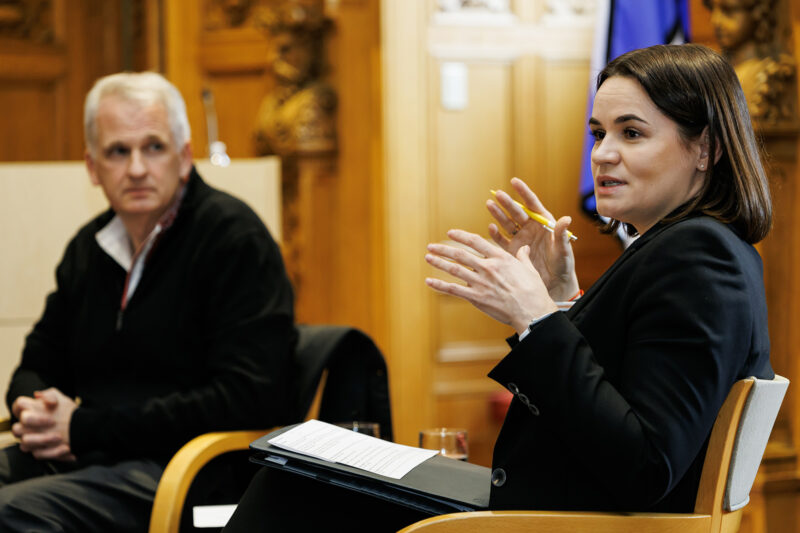In August 2020, Sviatlana Tsikhanouskaya was elected president of Belarus. Three years later, she’s living in exile in Lithuania, having been sentenced by her home country to 15 years in prison for treason and conspiracy to seize power.
Tsikhanouskaya visited the Jackson School of Global Affairs December 4 for a wide-ranging conversation on her motivation for running for president, the enduring authoritarian regime that forced her to flee, and her role as an opposition leader fighting for her country’s future.
“A dictatorship is like cancer — it will spread further and further, and it can hit anywhere,” Tsikhanouskaya told moderator Timothy Snyder, Richard C. Levin Professor of History and Global Affairs at Yale. “It’s very difficult, but we all have to fight it together.”
The dictator in this case is Alexander Lukashenko, the only president Belarus has had since its independence from the Soviet Union in 1991. His initial appeal was that of an “ordinary guy,” Tsikhanouskaya explained, but his reign quickly changed to corruption and cronyism. Opponents were jailed or killed, and elections were far from free and fair. Citizens who had lived for decades under Soviet rule, she said, still “felt small, like we couldn’t change anything” and believed the government knew better than the populace.
In recent years, there has been an increase in opposition to Lukashenko. In 2020, Tsikhanouskaya’s husband, Sergei, became a formidable presidential candidate, gaining popularity by traveling to cities and towns to speak with Belarusians.
Not long into the campaign, Sergei was imprisoned. He remains behind bars and Tsikhanouskaya has little information about his condition. A former English teacher and a mother of two, Tsikhanouskaya was not interested in politics but decided to run for president as a tribute to her husband and for the love of her country.
Then, “something unbelievable happened,” she said. “People went to the streets to demonstrate, to support each other. Millions of us are not satisfied with the system.”
Election results showed that Lukashenko won more than 80% of the vote, but independent election monitors have declared Tsikhanouskaya to be the winner and numerous countries — including those in the European Union — did not accept the results of the election.
For fear of retribution, Tsikhanouskaya is now operating an opposition government from Lithuania. She has met with other world leaders, appealing to them to recognize her as the legitimate president of Belarus and to levy sanctions against Lukashenko. She has also helped subvert Belarus’ involvement in Russia’s war against Ukraine, enlisting Belarusian volunteers to fight for Ukraine and take in Ukrainian refugees, and led efforts to sabotage trains that are carrying Russian military equipment through Belarus.
During the talk, Snyder took time to explain the long history between Belarus and Ukraine, which dates back centuries to when they were both part of the Grand Duchy of Lithuania. The recent conflicts in Ukraine have damaged that relationship, Tsikhanouskaya admits, but she is committed to rebuilding trust with their longtime ally.
“The fate of our countries is intertwined. Without a free Ukraine, there is not a free Belarus,” said Tsikhanouskaya. “We are facing the same enemy: the imperialistic ambitions of Russia.”
